Chi siamo
Chi siamo
The KnowRISK consortium consists of four partner organisations (IST, LNEC, INGV and EERC), including universities, laboratories and research centres, from three European Countries (Portugal, Italy and Iceland).
The National Civil Protection of participating countries will be involved in the project not as partners but as Advisory Board, where specific resources are allocated for their participation in general meetings and workshops.
ISTITUTO NAZIONALE DI GEOFISICA E VULCANOLOGIA
INGV team members:
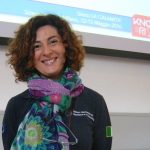 Gemma Musacchio
Gemma MusacchioPartnership Scientific Manager
Ph.D. in Earth Sciences, Master in Journalism and Science Communication. Scientist, author of several papers on science and risk education, Lithosphere studies, Seismology and rock physics, published in JCR journals and peer-review books.
Leader of science projects and dissemination programs, lecturer in Science Communication Schools and jury member for science dissemination prizes.
Scientific activity in the field of seismic risk and hazard assessment: procedures for the assessment of seismic risk at different geographical scales, integration of expert systems and geographic information systems for the evaluation of the seismic risk, development and comparison of codes for seismic hazard evaluation, uncertainty data processing, probabilistic modeling.
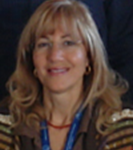 Susanna Falsaperla
Susanna FalsaperlaSenior researcher, co-chair of WOVO, with interest in the area of seismic and volcanic hazards. Expertise that spans a broad range of fields, including seismology, volcanology, statistics and pattern classification. Multidisciplinary research that brings together expertise in Earth Sciences and scientific outreach activity also to address issues of disaster risk reduction and societal resilience.
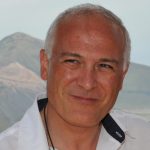 Raffaele Azzaro
Raffaele AzzaroDoctor in Geological Sciences. The research activity is focused on the volcanic region of Mt. Etna, and includes the following topics: i) Seismogenic faults and their behaviour by the analysis of long-term seismicity and active tectonics; ii) Seismic hazard assessment and damage scenarios; iii) Macroseismics and historical seismology and iv) Compilation of seismic catalogues and databases; parametrization of historical earthquakes.
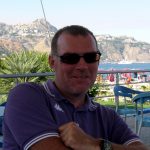 Salvatore D’Amico
Salvatore D’AmicoResearcher at INGV since 2002; the main research fields are related to studies of probabilistic seismic hazard, statistical analysis of seismic data, attenuation of seismic intensity and earthquake source parameter estimation.
Co-author of the Macroseismic Catalogue of Mt Etna earthquakes, which includes macroseismic seismic data of historical and recent earthquakes.
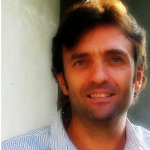 Massimiliano Cascone
Massimiliano CasconeSupporting activity for project researchers aimed to develop their graphics projects, multimedia files and scientific posters. In addition to this, supporting scientific dissemination through the organization of public exhibitions and the distribution of educational material.
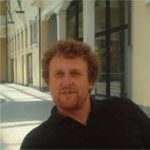 Massimo Crescimbene
Massimo CrescimbenePsychology. Specialized in Existential Analytic Psychotherapy. Advanced training in Psychodrama and Role Playing.
He worked at the CNR – National Group of Volcanology from 1986 to 1998. From 1999 to present he works at the INGV. He deals with psychosocial research: risk perception, rumours, emotional states, communication feedbacks. He plans, teaches and evaluates within the EDURISK project, aimed to the reduction of seismic and volcanic risks. He is responsible for research projects on seismic and volcanic risk perception.
 Elena Eva
Elena EvaPhD in Geophysics. Elena Eva is researcher In Seismology at INGV, author of 30 scientific JCR papers on Seismotectonics, Geodynamics and Risk Education. Has taken part to several educational project (GERIA, O3E, NERA) and educational exhibit.
 Horst Langer
Horst LangerHorst Langer is a seismologist working on ground motion scenarios based on empirical data as well as synthetic simulations. Further research activities regard automatic processing of seismic signals, pattern recognition, volcano monitoring and the development of automatic warning tools. Horst Langer has worked on seismic tomography and its interpretation in the framework of seismotectonics.
 Giovanna Lucia Piangiamore
Giovanna Lucia PiangiamorePh.D. in Earth Sciences. Researcher, author of papers in seismic hazard, magnetic and gravimetric exploration and educational-outreach experiments. Scientific technical coordinator of special venues for Environment Geophysics and Leader of projects for the reduction of Natural Risks at schools. Jury member of scientific literature prizes. A Master in Geophysics in 2001 and one in Scientific Journalism and Science Communication in progress.
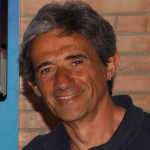 Nicola Alessandro Pino
Nicola Alessandro PinoSeismologist. Seismic data analysis, by means of direct and inverse methods, for studying Earth’s interior e seismic sources (earthquakes, volcanoes, landslides, tsunamis). Seismic hazard perception analysis. Education and outreach initiatives.
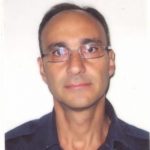 Danilo Reitano
Danilo ReitanoDanilo Reitano is an electronic engineer, Head of Reti e Innovazione Department. Over the past 15 years, inside the “Control Room”, he is a system integrator, coordinating aspects of ICT, HPC, Grid and Cloud computing, monitor and surveillance of active volcanoes. Since 2004 he organizes courses for students and he is involved in many dissemination projects.
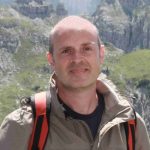 Luciano Scarfì
Luciano ScarfìGeology. Studies focus mainly on a better understanding of the geodynamic processes that characterize the Mediterranean area. Topics cover range including high-precision earthquake locations, crustal earth structure by tomographic techniques, stress field and the anisotropy in the crust. Other studies deal with the macroseismic effects of sizable earthquakes.
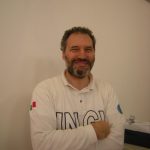 Stefano Solarino
Stefano SolarinoPhD in Geophysics. Senior researcher in Seismology, author of 40 scientific JCR papers and book articles on Seismotectonics, Geodynamics, Seismic Tomography, Geoethics, Risk Education. Has taken part to several educational projects (GERIA, O3E, NERA) and courses for school teachers . He has been one of the leaders of a WG for Communication within the European Seismological Commission.
 Thea Squarcina
Thea SquarcinaM.Sc. in Architecture, Ph.D. in Ergonomics Construction Engineering.
Thea Squarcina is an expert of seismic vulnerability of masonry buildings with knowledge gained in technological laboratory for building material, survey of structural type of construction, technical and scientific information for design of structural reinforcement and restoration of existing construction, evaluation of economic losses due to seismic events on residential buildings.
 Giuseppina Tusa
Giuseppina TusaProcessing, inversion and interpretation of instrumental seismological data: spectral analysis, cross-correlation technique, polarization analysis, response spectra, microtremor recordings, strong-motion data. Earthquake source parameters, attenuation and site effects in different geodynamic contexts. Synthetic seismograms application. Earthquake Early Warning. Development software in MATLAB.
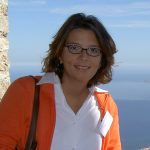 Tiziana Tuvé
Tiziana TuvéGeologist. The research activity is based on: estimate of seismic hazard assessment for site and for volcanic areas; statistical analysis of seismic data; historical seismology, earthquake catalogues and databases compilation; field surveys of macroseismic effect at sites; seismic attenuation mechanisms in tectonic and volcanic areas, analysis and probabilistic earthquake localization by instrumental data.

